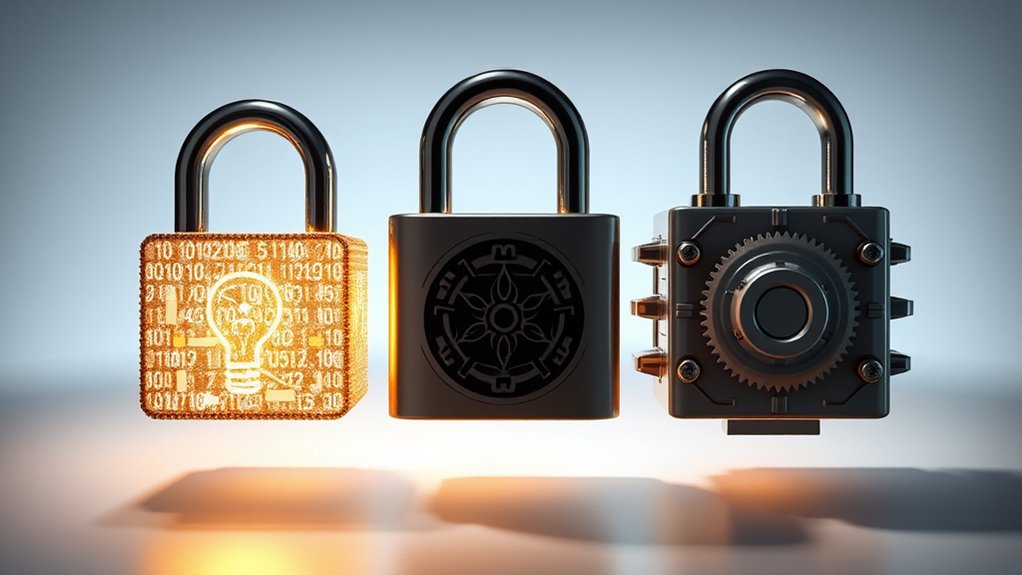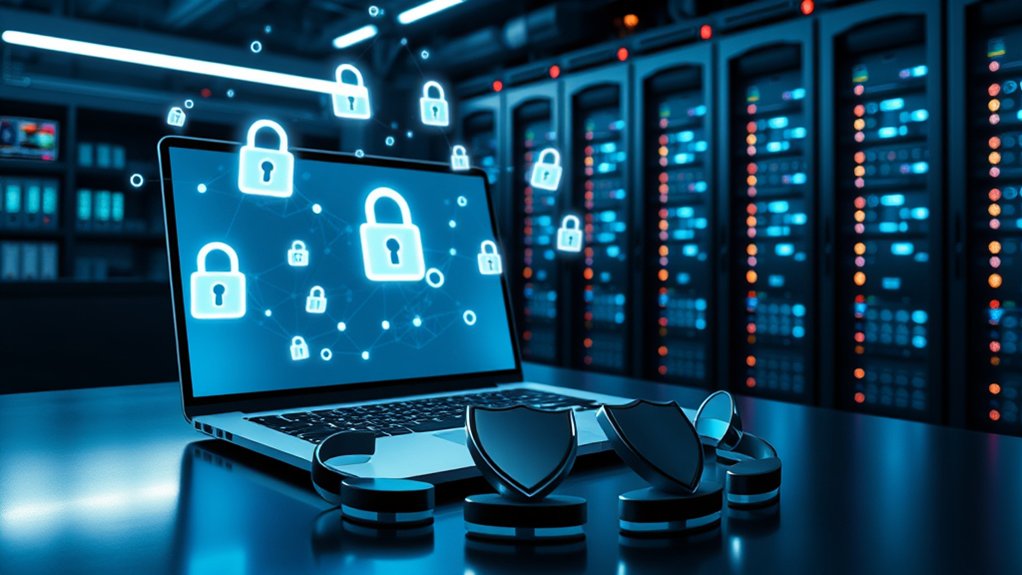The CIA Triad is a fundamental framework in cybersecurity, focusing on three key principles: confidentiality, integrity, and availability. Confidentiality protects sensitive information using encryption and strict access controls, whereas integrity guarantees data accuracy through mechanisms like digital signatures. Availability assures timely access to data, essential for operational efficiency. Organizations adopt tailored strategies based on their size and complexity, emphasizing continuous monitoring and employee training to combat evolving threats. Further exploration reveals additional practices and examples that improve cybersecurity resilience.

In an era where cyber threats are increasingly sophisticated, the CIA triad—comprising confidentiality, integrity, and availability—serves as a foundational model for information security within organizations. This model provides a framework that helps organizations implement effective security procedures and policies to protect their data. Its three components—confidentiality, integrity, and availability—are fundamental for evaluating and improving cybersecurity practices.
Confidentiality safeguards data from unauthorized access, employing strategies such as two-factor authentication and encryption to improve protection. It addresses vulnerabilities like phishing and spyware, making strict access controls and secure passwords imperative. The significance of confidentiality lies in its role in preserving data privacy, a pivotal factor in maintaining customer trust and regulatory compliance protection against unauthorized access. Additionally, organizations can utilize security procedures based on the CIA triad to further enhance their data protection strategies.
Confidentiality is essential for data protection, emphasizing access control and encryption to uphold privacy and trust.
Integrity guarantees data accuracy and authenticity, employing mechanisms such as hashing and digital signatures. It protects against vulnerabilities like SQL injection attacks, necessitating regular audits and data validation for effectiveness. The importance of integrity cannot be overstated, as trustworthy data is critical for informed decision-making and operational efficiency in organizations.
Availability assures users timely access to data, an aspect important for operational continuity. Strategies like DDoS response plans and system redundancy counteract vulnerabilities such as hardware failures. Regular system backups and fault tolerance are fundamental to preserving availability, which is critical for maintaining business operations, especially in industries that rely on real-time data access.
Incorporating the CIA triad helps organizations protect against unauthorized access and manipulation whilst guaranteeing compliance with regulations. This all-encompassing approach facilitates proactive identification and mitigation of vulnerabilities, optimizing cybersecurity postures.
Implementation varies according to the size and complexity of the organization, from basic encryption for small businesses to advanced encryption methods for larger entities. Continuous monitoring and employee training form fundamental parts of this strategic approach, addressing evolving threats in the cyber environment, eventually reinforcing the organization’s defenses against potential breaches.
Frequently Asked Questions
What Are Real-World Examples of the CIA Triad in Action?
Real-world applications of the CIA triad manifest prominently across various sectors.
In e-commerce, platforms safeguard confidentiality through secure logins, guarantee integrity with accurate order processing, and maintain availability via continuous support services.
Likewise, healthcare organizations utilize encryption to protect patient data as they implement data validation checks to uphold accuracy.
Financial institutions prioritize confidentiality of transactions, and, remarkably, incidents like the WannaCry ransomware attack highlight vulnerabilities in confidentiality, integrity, and availability across networks.
How Does the CIA Triad Apply to Personal Cybersecurity?
The CIA Triad—comprising confidentiality, integrity, and availability—serves as a foundational framework for personal cybersecurity.
Confidentiality is improved through encryption and strong password management, ensuring unauthorized access is impeded.
Integrity is maintained via data backups and hashing algorithms, vital for detecting unauthorized changes.
Finally, availability is supported through redundancy and disaster recovery plans, enabling swift access post-incident.
These principles collectively fortify personal security, highlighting the importance of thorough protective measures for individual users.
Can the CIA Triad Protect Against Physical Security Threats?
The CIA triad, although foundational for digital security, has limited efficacy against physical security threats. Physical access can compromise systems regardless of digital defenses.
For instance, studies indicate that 80% of data breaches stem from physical incidents, highlighting the need for strong physical controls.
Experts advocate for an integrated approach, combining logical strategies, such as encryption, with physical measures like secure access, to effectively mitigate risks and improve overall organizational security.
How Is the CIA Triad Relevant to Cloud Computing?
The CIA Triad is paramount in cloud computing, comprising confidentiality, integrity, and availability. These components guarantee that sensitive data remains protected from unauthorized access, maintains accuracy, and is readily accessible.
According to a 2022 study by Cybersecurity Ventures, organizations utilizing the CIA framework experienced a 30% decrease in data breaches.
Additionally, compliance with regulations such as GDPR improves trust among customers, thereby strengthening business relationships and safeguarding organizational reputation in a competitive environment.
What Tools Help Implement the Principles of the CIA Triad?
Various tools facilitate the implementation of the CIA triad principles. Encryption software guarantees data confidentiality by rendering information unreadable without proper access.
Checksum algorithms verify integrity, detecting unauthorized modifications to files. Redundancy strategies maintain system availability through backup components.
Multi-factor authentication improves security, whereas cloud services offer scalable storage solutions. Regular risk assessments identify vulnerabilities, strengthening protection measures.
Collectively, these tools improve data security strongly across multiple access points and platforms.









